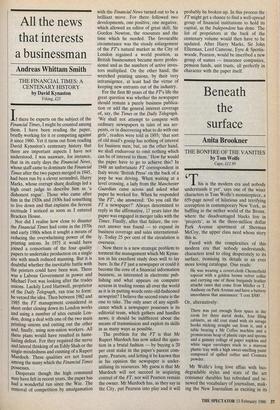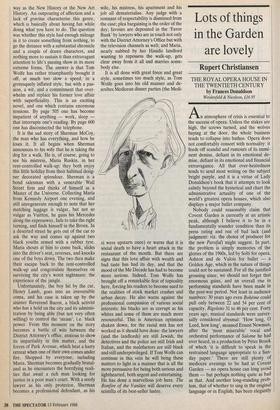Beneath the surface
Anita Brookner
THE BONFIRE OF THE VANITIES by Tom Wolfe
Cape, LI2.95
This is the modern era and nobody understands it yet', says one of the wiser characters in Tom Wolfe's monsterpiece, a 659-page novel of hilarious and terrifying corruption in contemporary New York, as baffling in the nether world of the Bronx, where the disadvantaged blacks live in `projects', as in the three-million dollar Park Avenue apartment of Sherman McCoy, the upper class nerd whose story this is.
Faced with the complexities of this modern era that nobody understands, characters tend to cling desperately to its surface, itemising its details in an ever more loving catalogue. One reads: He was wearing a covert-cloth Chesterfield topcoat with a golden brown velvet collar and carrying one of those burgundy leather attaché cases that come from Madler or T. Anthony on Park Avenue and have a buttery smoothness that announces: 'I cost $500'.
Or, alternatively:
There was just enough floor space in the room for three metal desks, four filing cabinets, an old coat stand with six savage hooks sticking straight out from it, and a table bearing a Mr Coffee machine and a promiscuous heap of plastic cups and spoons and a gummy collage of paper napkins and white sugar envelopes stuck to a maroon plastic tray with a high sweet-smelling paste composed of spilled coffee and Cremora powder.
Mr Wolfe's long love affair with bio- degradable styles and state of the art consumer durables has refreshed and re- newed the vocabulary of journalism, mak- ing the New Journalism as exciting in its way as the New History or the New Art History. An outpouring of affection and a lack of gravitas characterise this genre, which is basically about having fun while doing what you have to do. The question was whether this style had enough mileage in it to create something from nothing, to go the distance with a substantial chronicle and a couple of dozen characters, and nothing more to sustain it than extravagant attention to life's passing show in its more extreme forms. The answer is that Tom Wolfe has rather triumphantly brought it off, at much too slow a speed, in a grotesquely inflated style, but with a pas- sion, a wit, and a commitment that over- whelm and replace his former love affair with superficiality. This is an exciting novel, and one which contains enormous tensions. By page 505 one has become impatient of anything — work, sleep that interrupts one's reading. By page 600 one has disconnected the telephone.
It is the sad story of Sherman McCoy, the man who has everything, and how he loses it. It all begins when Sherman announces to his wife that he is taking the dog for a walk. He is, of course, going to see his mistress, Maria Ruskin, in her rent-controlled walk-up: they both enjoy this little holiday from their habitual desig- ner decorated splendour. Sherman is a bond salesman with a venerable Wall Street firm and thinks of himself as a Master of the Universe. Collecting Maria from Kennedy Airport one evening, and still unregenerate enough to note that her matching luggage is vulgar, but not so vulgar as Vuitton, he guns his Mercedes along the expressway, fails to take the right turning, and finds himself in the Bronx. In a deserted street he gets out of the car to ask the way and comes up against two black youths armed with a rubber tyre. Maria shouts at him to come back, slides into the driver's seat, reverses, and knocks one of the boys down. The two then make their escape back to the rent-controlled walk-up and congratulate themselves on surviving the city's worst nightmare: the experience of the jungle.
Unfortunately, the boy hit by the car, Henry Lamb, goes into an irreversible coma, and his case is taken up by the sinister Reverend Bacon, a black activist who has a hold on the city and its adminis- tration by being able (but not very often willing) to control the 'steam', i.e. black power. From this moment on the story becomes a battle of wits between the District Attorney's office, anxious to show its impartiality in this matter, and the forces of Park Avenue, which beat a hasty retreat when one of their own comes under fire. Shopped by everyone, including Maria, Sherman becomes gradually brutal- ised as he encounters the horrifying reali- ties that await a rich man looking for justice in a poor man's court. With a seedy lawyer as his only protector, Sherman becomes a professional defendant, as his wife, his mistress, his apartment and his job all dematerialise. Any judge with a remnant of respectability is dismissed from the case; plea bargaining is the order of the day; favours are deposited in the 'Favor Bank' by lawyers who are in touch not only with the District Attorney's Office but with the television channels as well; and Maria, nearly nabbed by her Hasidic landlord wanting to repossess the walk-up, gets clear away from it all and marries some- body else.
It is all done with great force and great style, sometimes too much style, as Tom Wolfe goes into his old manner and de scribes Medicean dinner parties (the Medi- ci were upstarts once) or warns that it is social death to have a heart attack in the restaurant of the month. But there are signs that this love affair with wealth and bad taste has had its day, and that the mood of the Me Decade has had to become more serious. Indeed, Tom Wolfe has brought off a remarkable feat of topicality here, forcing his readers to become used to the realities of stock market crashes and urban decay. He also warns against the professional compassion of various social interests: his blacks are as corrupt as his whites and some of them are much more resourceful. This is American optimism shaken down, for the racial mix has not worked as it should have done: the lawyers (and the landlords) are still Jewish, the detectives and the police are still Irish and Italian, and the malefactors are still black and still underprivileged. If Tom Wolfe can continue in this vein he will bring these matters to light in a manner that is all the more persuasive for being both serious and lighthearted, both urgent and entertaining. He has done a marvellous job here. The Bonfire of the Vanities will deserve every scintilla of its best-seller lustre.



























































 Previous page
Previous page